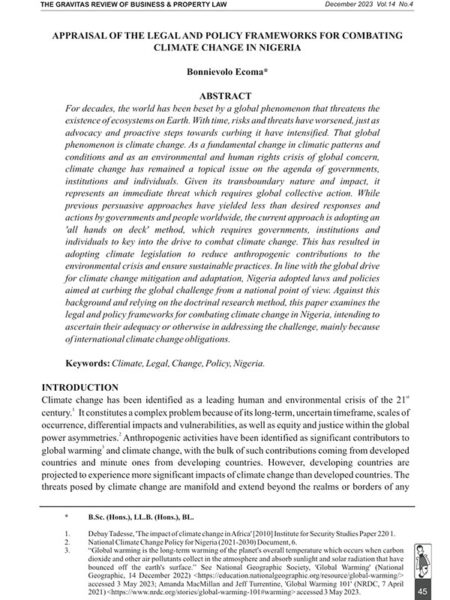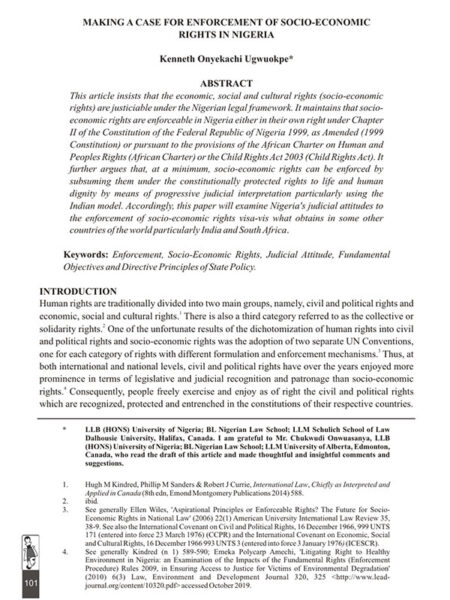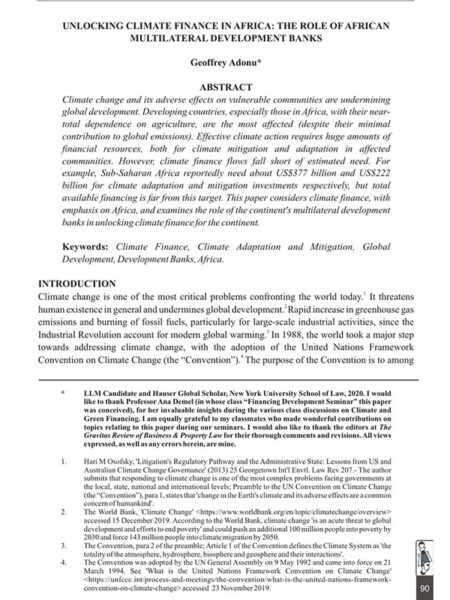-

Appraisal of the Legal and Policy Frameworks for Combating Climate Change in Nigeria
0₦2,500.00Bonnievolo Ecoma, in this article, Appraisal of the Legal and Policy Frameworks for Combating Climate Change in Nigeria, appraises the legal and policy frameworks for combating climate change in Nigeria. For decades, the world has been beset by a global phenomenon that threatens the existence of ecosystems on Earth. With time, risks and threats have worsened, just as advocacy and proactive steps towards curbing it have intensified. That global phenomenon is climate change. As a fundamental change in climatic patterns and conditions, and as an environmental and human rights crisis of global concern, climate change has remained a topical issue on the agenda of governments, institutions, and individuals. Given its trans-boundary nature and impact, it represents an immediate threat which requires global collective action. While previous persuasive approaches have yielded less than desired responses and actions by governments and people around the world, the current approach is the adoption of an ‘all hands on deck’ method which requires governments, institutions and individuals to key into the drive to combat climate change. This has resulted in the adoption of climate legislation aimed at reducing anthropogenic contributions to the environmental crisis, and ensuring sustainable practices. In line with the global drive for climate change mitigation and adaptation, Nigeria adopted laws and policies aimed at curbing the global challenge from a national point of view. Against this background and relying on the doctrinal research method, Ecoma examines the legal and policy frameworks for combating climate change in Nigeria, with a view to ascertaining their adequacy or otherwise in addressing the challenge, especially in view of international climate change obligations.
-

Making a Case for Enforcement of Socio-Economic Rights in Nigeria
0₦2,500.00Kenneth Ugwuokpe in his article, Making a Case for Enforcement of Socio-Economic Rights in Nigeria, insists, no doubt controversially, that the economic, social and cultural rights indicated as “fundamental objectives and directive principles of state policy” in the 1999 Constitution of Nigeria, are justiciable under the Nigerian legal framework. Kenneth argues that the socio-economic rights are enforceable in Nigeria either in their own right under Chapter II of the Constitution or pursuant to the provisions of the African Charter on Human and Peoples Rights or the Child Rights Act 2003. He further posits that, at a minimum, socio-economic rights can be enforced by subsuming them under the constitutionally protected rights to life and human dignity by means of progressive judicial interpretation, particularly using the Indian model. He examines Nigeria’s judicial attitudes to the enforcement of socio-economic rights vis-a-vis what obtains in some other countries, notably India and South Africa.
-

Unlocking Climate Finance in Africa: The Role of African Multilateral Development Banks
0₦2,500.00Geoffrey Adonu, Graduate Student at the New York University School of Law in, Unlocking Climate Finance in Africa: The Role of African Multilateral Development Banks, argues that climate change and its adverse effects on vulnerable communities are undermining global development. Developing countries, especially those in Africa, with their near-total dependence on agriculture, are the most affected despite their minimal contribution to global emissions. Effective climate action requires enormous amounts of financial resources, both for climate mitigation and adaptation in affected communities. However, climate finance flows fall short of the estimated need. Sub-Saharan Africa reportedly needs about US$377 billion and US$222 billion for climate adaptation and mitigation investments respectively, but total available financing is far from this target. Geoffrey considers climate finance, with emphasis on Africa, and examines the role of the continent’s multilateral development banks in unlocking climate finance for the continent.
The Gravitas Review of Business & Property Law



